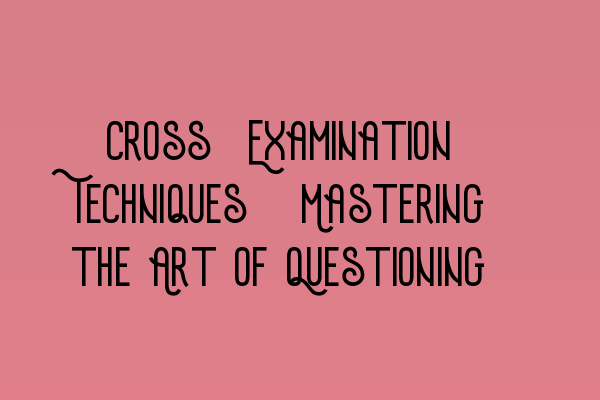Cross-Examination Techniques: Mastering the Art of Questioning
Welcome to the SQE Criminal Law & Practice Law UK blog! Today, we are delving into the fascinating world of cross-examination techniques. As a solicitor, mastering the art of questioning is essential to effectively present your case and uncover the truth in a courtroom. From building credibility to extracting crucial information, cross-examination can make or break your case. So, let’s dive in and explore the strategies that will help you become a master of cross-examination.
The Importance of Preparation in Cross-Examination
Before we dive into the specific techniques, it’s vital to emphasize the significance of preparation in cross-examination. Just like any other aspect of law, successful cross-examination requires careful planning and thorough understanding of the case at hand. By familiarizing yourself with the relevant laws, evidence, and witness statements, you can tailor your questions to expose weaknesses and inconsistencies in the testimony.
Furthermore, preparing a comprehensive outline of your cross-examination strategy will ensure that you cover all the essential points and maintain a logical flow of questioning throughout the process. This level of preparation will not only boost your confidence but also enhance your overall effectiveness as a cross-examiner.
Establishing Credibility
One of the first crucial steps in cross-examination is establishing your credibility as a solicitor. Jurors and judges must perceive you as knowledgeable, reliable, and professional. To achieve this, maintain a calm and composed demeanor throughout the questioning process. Avoid adopting an aggressive or confrontational tone, as it may alienate the jury or witness.
Additionally, referencing legal cases and precedents when relevant can demonstrate your expertise to the court and further bolster your credibility. By showing that you have a deep understanding of the law, you’re more likely to gain the trust and respect of the judge and jury.
Open-Ended Questions
One of the most effective techniques in cross-examination is the use of open-ended questions. Open-ended questions encourage the witness to provide detailed and informative responses. Rather than asking yes or no questions, ask questions that begin with words such as “who,” “what,” “where,” “when,” “why,” and “how.”
For example, instead of asking, “Did you witness the defendant at the scene of the crime?” use the open-ended question, “Can you provide a detailed account of what you saw at the scene of the crime?” This technique allows the witness to provide a more comprehensive and revealing testimony, thereby increasing the chances of obtaining valuable information for your case.
Leading Questions
While open-ended questions are effective, leading questions can be equally powerful when used strategically. Leading questions are designed to guide the witness towards a desired answer. By using leading questions, you can control the narrative and sway the testimony in your favor.
However, it’s essential to use leading questions judiciously and be mindful of the rules of court. Leading questions should generally be used during cross-examination and not during direct examination. As a solicitor, you must strike a balance between shaping the witness’s testimony and avoiding objections from opposing counsel.
Impeachment and Confrontation
Another critical aspect of cross-examination is impeachment and confrontation. Impeachment refers to the act of challenging the credibility and accuracy of a witness’s testimony, while confrontation involves directly challenging the witness’s version of events.
Impeachment can be achieved through various techniques, such as introducing prior inconsistent statements, highlighting biases or prejudices, and exposing any motive the witness may have to testify falsely. By effectively impeaching a witness, you can create doubt in the minds of the judge and jury regarding the veracity of their testimony.
Confrontation, on the other hand, allows you to directly challenge the credibility of the witness by presenting evidence or extracting admissions that contradict their version of events. This technique requires careful questioning and a thorough understanding of the facts of the case.
Building a Powerful Closing Argument
Finally, a successful cross-examination should contribute to the strength of your closing argument. Throughout the questioning process, ensure that you are gathering evidence and building a compelling narrative that supports your case theory. By strategically choosing which facts and admissions to highlight during cross-examination, you can create a powerful closing argument that resonates with the judge and jury.
In conclusion, mastering the art of questioning through effective cross-examination techniques is a critical skill for any solicitor. By preparing diligently, establishing credibility, using open-ended and leading questions strategically, employing impeachment and confrontation techniques, and building a powerful closing argument, you can maximize your chances of success in the courtroom.
For further reading on other relevant topics, check out these articles:
- Legal Representation for Delaware LLCs in the UK: Expert Advice
- SQE Exam Prep: Essential Study Materials for Aspiring Solicitors
- Expert Testimonies in UK Courts: Building Strong Cases
- Demystifying the Solicitors Qualifying Examination Format
- SQE Exam for International Lawyers: Challenges and Success Strategies
